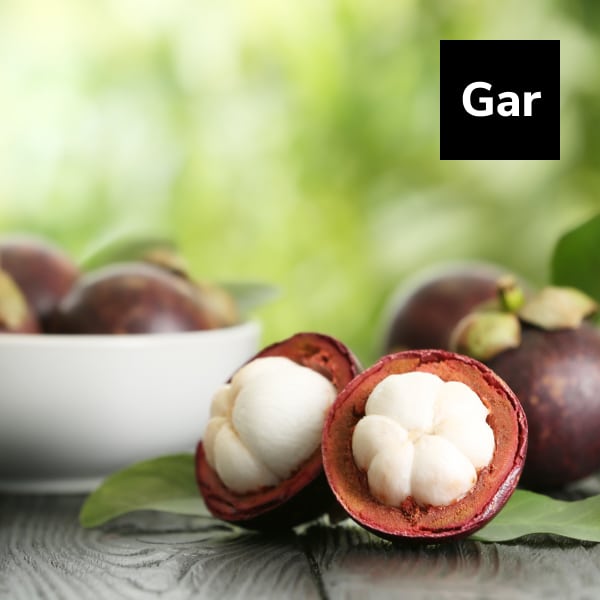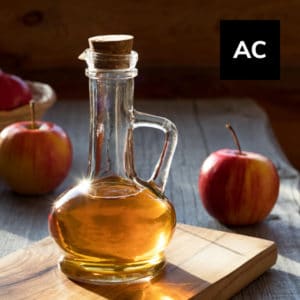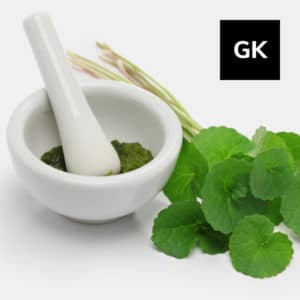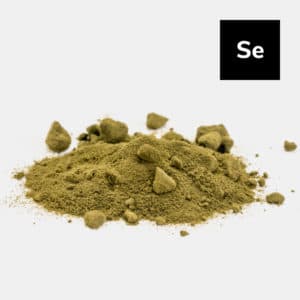Overview
Garcinia is a pumpkin-shaped Asian fruit also known as Malabar tamarind, red mango, brindle berry, and gambooge. The fruit is the size of a large tomato and can grow to grapefruit size. Its flesh is very sour, so it’s usually pickled and used as a condiment in Thai and Indian food.
The rind contains hydroxycitric acid (HCA), which is a popular supplement for modest weight loss, suppressing the appetite, and boosting exercise endurance. Serotonin levels have also been proven to rise.
Key Benefits
- Inhibits fat production in the body
- Reduces fat storage
- Boosts metabolism
- Supports glucose metabolism
- Curbs cravings and hunger
- Supports sleep and mood
- Accelerates weight loss
- Aids the conversion of food into energy
- Supports healthy blood lipid levels
History of Usage
The first research on the effectiveness of garcinia was done in 1998, with mixed results. Since then, garcinia has received mixed reviews. As obesity rates rise, it has become more popular as a weight loss aid with modest results. However, it has been found to have many other health benefits, as described above.
The amount of garcinia cambogia specified on the label is not included in many of these supplements, as stated by ConsumerLab.com. Rather, the doses were determined to be either too low or too high. Consumers are advised to buy a reputable brand and make sure the supplements contain at least 50 percent HCA.
Biochemistry
HCA, the major organic acid in the rind of the garcinia fruit, is a dual-action fat buster since it suppresses appetite while also preventing fat formation, absorption, and storage. HCA inhibits the enzyme that turns glucose to fat cells in the body. Instead, it activates a pathway that allows the body to convert glucose to energy.
The fruit’s extracts, as well as (-)-hydroxycitric acid (HCA), have been demonstrated in studies to have anti-obesity effects, including reduced food intake and body fat gain by modulating serotonin levels related to satiety, increased fat burning, and decreased de novo lipogenesis. HCA is a strong inhibitor of adenosine triphosphate-citrate lyase, a catalyst for the conversion of citrate to acetyl-coenzyme A, which is required for the synthesis of fatty acids, cholesterol, and triglycerides.
In vitro and in vivo studies revealed that the plant’s crude extract or components had hypolipidemic, anti-diabetic, anti-inflammatory, anticancer, anthelmintic, anticholinesterase, and hepatoprotective properties. Phytochemical tests of various plant sections revealed the presence of xanthones (e.g., carbogiol) and benzophenones (e.g., garcinol), as well as organic acids (e.g., HCA) and amino acids (e.g., gamma aminobutyric acid).
A rich supply of thiamine, niacin, folic acid, magnesium, Vitamin B, potassium, manganese and HCA can be found in garcinia extract.
A wide variety of Garcinia cambogia/HCA dietary supplements for weight loss are currently on the market, while the potential toxicity linked with frequent use of these supplements has aroused concerns. The majority of complaints have been attributed to multicomponent formulations, and Garcinia cambogia has not been established as the possibly hazardous culprit at this time.
Recent Trends
The rise in global obesity, as well as media attention, has aided the garcinia market’s development.
The global garcinia market is expected to be worth $127.95 million by 2025, growing at a 3.77 percent CAGR during the forecast period. During the projected period, the worldwide garcinia market is expected to rise at a rapid pace.
Garcinia extract is available in a variety of forms, including liquid, powder, tablet, and capsule.
Precautions
- Pregnant and breastfeeding women should not use garcinia because there is not enough medical data to support its safety.
- Individuals on diabetic medication should consult with a health care provider before taking garcinia.
- Headache and nausea, diarrhea and other gastrointestinal issues among side effects connected with garcinia.
- Individuals with liver issues should not take garcinia. Cases of liver damage have been reported with high dosage intake.
- Individuals who take SSRIs should consult with their healthcare provider before taking garcinia.
References
- Fassina P, Scherer Adami F, Terezinha Zani V, Kasper Machado IC, Garavaglia J, Quevedo Grave MT, Ramos R, Morelo Dal Bosco S. THE EFFECT OF GARCINIA CAMBOGIA AS COADJUVANT IN THE WEIGHT LOSS PROCESS. Nutr Hosp. 2015 Dec 1;32(6):2400-8. doi: 10.3305/nh.2015.32.6.9587. PMID: 26667686.
- Sripradha R, Sridhar MG, Maithili Karpaga Selvi N. Antihyperlipidemic and antioxidant activities of the ethanolic extract of Garcinia cambogia on high fat diet-fed rats. J Complement Integr Med. 2016 Mar;13(1):9-16. doi: 10.1515/jcim-2015-0020. PMID: 26595408.
- Lim K, Ryu S, Nho HS, Choi SK, Kwon T, Suh H, So J, Tomita K, Okuhara Y, Shigematsu N. (-)-Hydroxycitric acid ingestion increases fat utilization during exercise in untrained women. J Nutr Sci Vitaminol (Tokyo). 2003 Jun;49(3):163-7. doi: 10.3177/jnsv.49.163. PMID: 12953793.
- Vasques CA, Schneider R, Klein-Júnior LC, Falavigna A, Piazza I, Rossetto S. Hypolipemic effect of Garcinia cambogia in obese women. Phytother Res. 2014 Jun;28(6):887-91. doi: 10.1002/ptr.5076. Epub 2013 Oct 17. PMID: 24133059.
- Crescioli G, Lombardi N, Bettiol A, et al. Acute liver injury following Garcinia cambogia weight-loss supplementation: case series and literature review. Internal and Emergency Medicine. 2018;13(6):857-872.
- Hendrickson BP, Shaikh N, Occhiogrosso M, Penzner JB.Mania Induced by Garcinia cambogia: A Case Series. Prim Care Companion CNS Disord. 2016 Apr 28;18(2):10.4088/PCC.15l01890. doi: 10.4088/PCC.15l01890.
- Semwal RB, Semwal DK, Vermaak I, Viljoen A. A comprehensive scientific overview of Garcinia cambogia. Fitoterapia. 2015 Apr;102:134-48. doi: 10.1016/j.fitote.2015.02.012. Epub 2015 Feb 27. PMID: 25732350.




